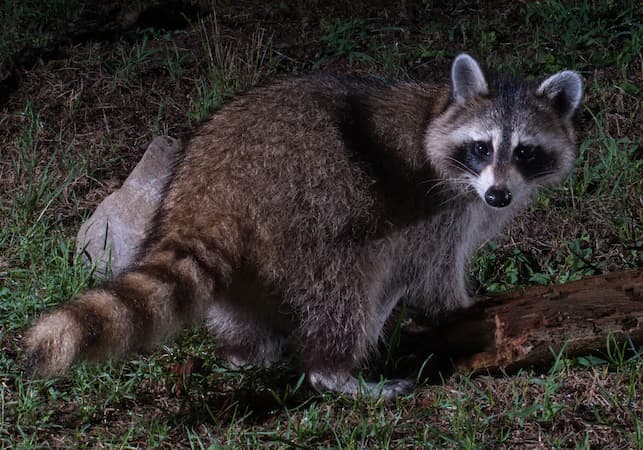Raccoon Control for the Yard and Home Garden

About Raccoons and Raccoon Control
Raccoon control in the backyard and home garden is perhaps the top animal pest concern. Homeowners and gardeners alike fear raccoons more than any other animal. Furthermore, gardeners might have little or nothing to harvest without controlling these critters. Both homeowners and gardeners worry over the possibility of raccoons having rabies. Without a doubt, no one wants opportunistic raccoons in their neighborhood, yard, or garden.
Raccoons are a real pest around the yard and garden. They are smart, adaptable, and with opposing thumbs. They make themselves very much at home in suburban and urban areas. Primarily nocturnal creatures, they enjoy many garden vegetables and fruits. Raccoons will forage around trash cans, eat your pet’s food if left outside, and garbage, in search of food. They will even go after your bird feeder.
Despite being a nuisance, the potential for rabies in raccoons causes us the most fear.
If a Raccoon decides to take up residence in your area, no doubt you will want it gone in a hurry. As a result, homeowners call their local animal control as soon as they are spotted in the neighborhood.
Raccoon Control - Understanding Their Lifestyle and Habitat.
Found throughout North America, Raccoons live 10 – 13 years. Adults normally grow to 10 – 30 pounds. But, can grow up to 45 pounds. Raccoons are commonly described as intelligent and curious creatures. They can also be sociable….. within the raccoon family.
Raccoons are generally nocturnal (awake and active at night). On occasion, they can be seen during the daytime. The presence of a raccoon acting normally during daylight hours does not mean it is rabid. However, if it is seen as acting strangely, then you should assume it is rabid, and contact your local animal control authority immediately.
Raccoons prefer a home in a tree cavity. But, they are known to take up residence in many manmade structures, including sheds and the attic of houses.
Raccoons are not true hibernators. They are less active in the winter months but will come out on occasion during warm spells. Females will have a litter of 1-6 babies in April or May. The babies will stay with their mother until Fall.
Raccoon Diet
Raccoons will eat almost anything. Put some leftover food scraps out in an unsecured trash can, and they will find it, tip over the trash can, and chow down. In the garden, they eat a variety of vegetables, most notably corn. And, they love peaches and other fruits.
In the wild, a raccoon’s diet is quite varied, too. They will eat many garden vegetables, fruit from your fruit trees, nuts, fish, shellfish, frogs, eggs, insects, worms, and even snakes. Also, you may find them snacking from your bird feeder, too.
Raccoon Control Methods
The methods of controlling raccoons are limited. Raccoons are climbers, so fences and screens are of little use. They will chew through plastic garden netting.
Here are some raccoon control methods that will help you to get rid of them:
1. Trapping: Hav-a-hart traps are an effective means of capturing raccoons. Once they are trapped many towns will take them away for you.
Best bait: Try sardines and watermelon. They find this combination hard to resist.
Important: Before you trap any animals, make sure to check your local laws. Many localities allow you to trap animals and pests. Your local Animal Control Department may even supply the trap. But, you are not allowed to transfer or release an animal into another area. In this case, your Animal Control Department must be notified for Raccoon removal.
3. Hunting: If you can hunt in your area, this will work….. if you are a good shot. Check local laws, for rules and regulations.
Raccoon Control - Related Articles
Please support our site. Shop for:
- rmmatthews100@hotmail.com
- 585-721-6528
- Rochester, NY
©1999-2024 GardenersNet.Com, All Rights Reserved

